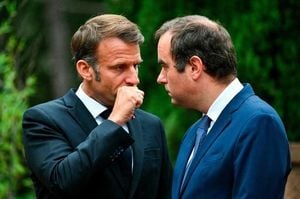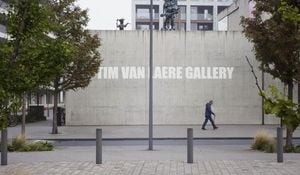Wembley Stadium was charged with emotion and reflection as Liverpool and Crystal Palace prepared to face off for the Community Shield on August 10, 2025. But before a ball was kicked, the football world paused to honor the memory of former Liverpool striker Diogo Jota, who tragically lost his life in a car accident alongside his brother Andre Silva just five weeks earlier. The moment, meant to unite fans in grief and respect, instead sparked a ripple of controversy and reflection that has resonated throughout the football community.
As the teams lined up, wreaths were solemnly placed at the edge of the pitch. Liverpool’s legendary goal scorer Ian Rush, Crystal Palace Chairman Steve Parish, and FA president Hewitt stepped forward to lay flowers, their gestures echoed by the respectful applause that swept across Wembley as images of Jota and Silva were displayed on the big screen. Liverpool fans, in a spine-tingling display of unity, sang "You'll Never Walk Alone" and unfurled a white banner emblazoned with 'Diogo J' and his iconic number 20 jersey. Every detail was designed to honor a player whose legacy had already left a mark on Merseyside and beyond.
Yet, the poignant silence was unexpectedly disrupted. A small section of Crystal Palace supporters broke the moment of quiet, their voices momentarily clashing with the somber mood. The disturbance sparked immediate reactions, both from their fellow Palace fans—who quickly tried to restore order—and from the Liverpool faithful, who were visibly upset by the lack of decorum. The incident was brief, but its impact lingered, raising questions about respect, memory, and the unpredictable nature of collective mourning at massive sporting events.
Liverpool’s new head coach, Arne Slot, addressed the situation with a measured and empathetic perspective. Speaking two days later, he downplayed the disruption, emphasizing that he did not believe there was any malicious intent behind the actions of the Palace supporters. "I don't think this was planned, or that it was the idea of a fan making a fuss. Maybe he didn't realize the fact that it was a moment of silence," Slot explained. "They tried to calm him down, but it was also a bit noisy. Then, our fans reacted. So, I don't think there was any bad intentions behind it."
Slot went further, seeking to bridge the gap between rival supporters. "The supporters of Crystal Palace and around the world have great respect for Diogo and Andre. I think, it's bad luck or, I can't find the right word, but I don't think there's any bad intentions in it." He acknowledged the possibility that the passage of time—five weeks since the tragedy—may have dulled the awareness of some fans, especially in the excitement of the Community Shield occasion. "That (Jota's incident) was also five weeks ago, so maybe that's why maybe these supporters were so happy they were at Community Shield, forgot immediately a second later," Slot added, hinting at the complex emotions that swirl around such high-profile matches.
Slot’s comments struck a chord with many in the footballing world, who recognized the delicate balance between celebration and remembrance. The Liverpool coach also looked ahead, noting, "We'll see Saturday, August 16, 2025, when Bournemouth comes to our stadium, how respectful it will be." His words underscored the ongoing nature of grief and the need for continued respect as the season unfolds.
While the focus at Wembley was on Jota’s memory, the tragedy also reverberated far beyond Liverpool. West Ham’s Michail Antonio, who himself survived a terrifying car crash just eight months earlier, offered a deeply personal reflection on the impact of Jota’s passing. Speaking to Standard Sport at the Community Shield, Antonio recalled the moment he learned of the news. "It shocked me from my core," he admitted. "I was in the gym, doing some strength work on my leg at the time with one of my physios, and he told me. I called it a day and went home. It shocked me to my very core as it could easily have been me."
Antonio’s own accident, which left him with a broken leg after crashing into a tree while driving home from West Ham’s training ground, gave him a unique perspective on the fragility of life. "I was literally on my way home from training and I almost lost my life, so now I just move forward and everything I do and just try and focus on my next steps," he said. The loss of Jota, he explained, was a stark reminder to appreciate every moment and to stay focused on what matters most.
The ripple effects of Jota’s death and Antonio’s survival extended into the fabric of English football, as West Ham navigated its own changes. With Antonio’s departure, the club signed Callum Wilson, who approached his friend to request the iconic No. 9 shirt—a gesture that spoke volumes about mutual respect and camaraderie. "I was happy for him. And he said it to me before on our [Footballer's Football Podcast]. He said 'I'm going to take your place!' He ended up signing, and he called me afterwards and asked me for my No9 shirt out of respect, which he didn't have to do because I've left the club. He called me up and I was like, 'to be honest, before me, I would have said you wouldn't want it, because the record wasn't the best, but obviously, I've done it well for you right now.' So, he's gone in there and I'm happy for him. Him and me are very close, we speak all the time. I'm hoping that he goes in there and does well."
Such moments of connection and respect, even amid fierce competition, are a reminder of football’s unique power to unite and heal. As the new season dawns, the memory of Diogo Jota and Andre Silva will linger in the hearts of those who knew them, played with them, or simply cheered them on from the stands. The Community Shield, often seen as a curtain-raiser for the season, became this year a stage for collective mourning, reflection, and an affirmation of the values that underpin the sport.
With Bournemouth set to visit Anfield on August 16, all eyes will be on the stands to see how supporters continue to honor Jota’s legacy. For Liverpool, Crystal Palace, West Ham, and the wider football family, the lessons of respect, empathy, and resilience are sure to guide the months ahead. The story of Diogo Jota’s passing—and the responses it has inspired—reminds us that football, at its best, is about far more than the final score.





